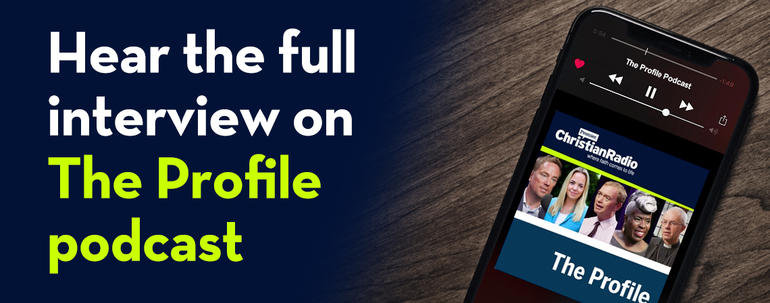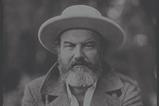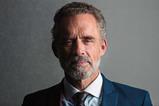Justin Brierley meets the Archbishop of Canterbury
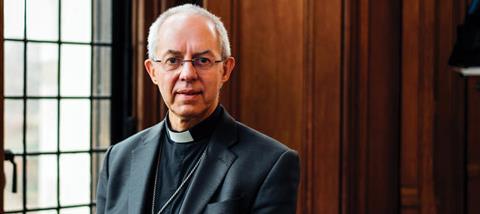
Justin Welby prays in tongues every day. Whether or not you think that is a newsworthy fact about the 105th Archbishop of Canterbury, it was remarkable enough to generate several articles in The Guardian and The Times newspapers at the beginning of this year
The comments were made during a wide-ranging interview I conducted with Welby on the challenges and opportunities he has faced six years into his role as the leader of the Anglican Communion.
Not that Welby saw speaking in a heavenly language as something “to make a great song and dance about”. He freely offered the information as an unremarkable fact about his morning routine. After all, around half a billion other Christians in the charismatic and Pentecostal traditions would claim something similar.
But the ease with which he spoke about tongues and his openness to receiving words of knowledge and prophecies as a way of hearing from God, do tell you something about Welby’s own church background.
Long before he was ordained, Welby was a committed member of one of the most influential evangelical churches in the CofE: Holy Trinity Brompton (HTB). Led by Nicky Gumbel, the church is known all over the world for being the home of the Alpha course. It’s also charismatic, but Welby says he prefers to avoid such “tribal” labels (every Christian is filled with the Spirit, he reminds me).
Nevertheless, the prominence of Alpha, the spread of the charismatic movement and the success of St Mellitus as a training ground for ordinands, has seen the Church of England skew significantly in the direction of HTB’s style and theology. Many have said it was only a matter of time before an archbishop emerged from the ranks of the flagship London church.
Welby was converted as a student at the University of Cambridge after a friend shared the gospel with him during a late-night conversation. The experience impressed upon him the importance of evangelism. His early corporate career in the oil industry would also prove useful training for the logistical realities of running an institution as diverse and complex as the Church of England.
My job is to pray for the unity of the Church
Having interviewed them both, there’s no doubt that Welby is a more media-savvy incumbent than his predecessor, Dr Rowan Williams, who always seemed more at home in the lecture hall than the radio studio. Welby offers to pray as we sit down (I gladly accept, though I’m not sure if non-Christian journalists get the same offer). He laughs often and builds an easy rapport. Some good-natured ribbing of my interview style sits easily alongside thoughtful responses to serious subjects.
As the UK’s most prominent Christian leader, he has been unafraid to weigh in on issues like payday lenders, food banks and the welfare system. Yet, while his statements on political issues tend to generate the most media attention, Welby has said his ministry priorities are prayer, evangelism and reconciliation.
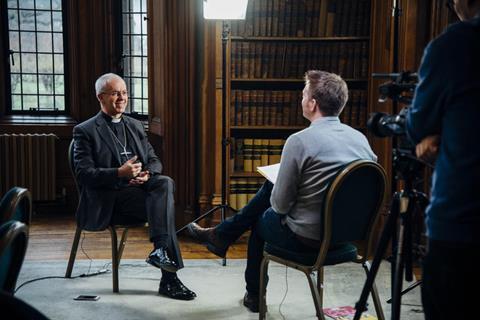
The archbishop’s fast-growing annual initiative Thy Kingdom Come is arguably a combination of all three of these priorities. The premise is simple: in the ten days between Ascension and Pentecost, participants pray every day for five friends to come to faith in Christ. What began as an Anglican endeavour three years ago has now been adopted by the whole of the UK Church, as leaders from every denomination encourage their members to take part.
Seeing new people come to Christ as Christians unite in prayer is one thrilling aspect of an archbishop’s role, but dealing with inevitable controversies is part of the job description too. As the sexuality debate rumbles on, the prospect of ‘transgender services’ has most recently proved a point of contention. When I ask him about it, Welby says the bishops’ guidance on using established liturgy to mark a gender transition was in no way compulsory or binding on any clergy. He is also emphatic that it does not represent any change in doctrine on baptism.
I genuinely don’t know whether the Church of England will hold together
The real testing ground will come next year when the Lambeth Conference 2020 takes place. The once-a-decade gathering of bishops from across the world could mark a make-or-break moment as conservative provinces in the Global South (where the vast majority of confessing Anglicans are now situated) grow increasingly dismayed at their North American counterparts’ liberal attitudes towards gay marriage. So, can the Anglican Communion hold together? “I don’t know” comes the honest response from its symbolic head. Welby admits he’s not an optimist by nature, but says he is hope-filled nevertheless. The difference is significant and involves his faithful commitment to a person he trusts in more than himself – Jesus Christ.
Thy Kingdom Come will be taking place in the run-up to Pentecost. You’ve said that you sense the work of the Spirit in it very clearly. Why is that?
It’s very unusual for something like this to gather Christians on such a global basis. It’s no longer an Anglican thing. When the Archbishop of York and I launched it, we hoisted a small sail rather nervously, and there was a howling gale of the Spirit which seemed to carry this whole thing forward in the most beautiful way.
It says: “pray for people to come to faith in Jesus Christ”, but how you pray is up to you. So it gives space for people around the world, in different cultures and Church traditions, to simply say: “OK, we’ll do it this way.”
What surprised you when you put up your sail and the wind started blowing?
Initially, the thing that surprised me most was the number of people who got involved.
Finding full cathedrals in the first year was rather amazing – you thought: “Something’s happening here.” All of us know that prayer isn’t always the easiest thing, but it seems to have just released in people a sense of: “This is good. This is what God wants.”
We just keep hearing people saying: “I can’t believe it. I started praying for five and…two of them…three of them…have become Christians.”
Who knew? Prayer works!
That’s what one of my great predecessors, William Temple, said: “When I pray, coincidences happen, and when I don’t, they don’t.”
So do you feel optimistic, regardless of what the statistics about Church decline may tell us?
I’m never optimistic. I’m always hopeful.
What’s the difference?
Optimism is human-created. Hope rests on the faithfulness of God in Christ, and that’s what we hold onto as Christians. We might be optimists; we might be pessimists, but we are all hope-filled, because that’s about Jesus.
I think it’s fair to say you’ve come from a reasonably charismatic background… How is that expressed in your prayer life?
[Laughs] I love the phrase “reasonably charismatic”! Are you an Anglican?
No, I’m not!
Well, you sound like one! In terms of my prayer life, the obvious thing is that part of my practice is praying in tongues every day. Not as an occasional thing, but just part of daily prayer. I also expect to hear from God through people with words of knowledge or prophecies. An awful lot of those come in and I read some of them and think: “I’m not totally sure about that.” Others you think: “Oh yes, I can sense something of the spirit of God in that.”
The danger with putting ‘charismatic’ as a sort of tribal category, is that all Christians are filled with the spirit. Paul is perfectly clear about that in Romans. Every Christian is a charismatic in that sense. So I’m cautious about turning it into a tribal thing.
Praying in tongues will be unremarkable to many Christians, but you can imagine some people who aren’t familiar with the practice saying: “Gosh, does the Archbishop of Canterbury really pray in tongues?”
It’s not something I make a great song and dance about, and given it’s usually extremely early in the morning, it’s not usually an immensely ecstatic moment!
It feels like we’re in a semi-permanent crisis with Brexit. Do you feel like the politicians have let us down so far?
No, I think they have the most extraordinarily difficult job. The burden of proof is on those who are arguing for no-deal to show that it will not harm the poorest and the most vulnerable, because they are close to the heart of God in Jesus Christ. But politicians have one of the hardest jobs in the world and we need to pray for them. It is unbelievably difficult.
What is your prayer for Theresa May?
When I pray for her and all our political leaders – which I do every day – I pray for wisdom, for courage and for strength for them and their families. I pray for their sense of wellbeing, that they will be blessed. They are precious people in the sight of God, and we entrust them with more responsibility than any of us could cope with.
You addressed the Trades Union Congress last year. You’ve said that Jesus was highly political but he wasn’t party political.
Exactly!
So would Jesus speak at the TUC?
Well, I was reading Luke 19 the other day – the restoration of Zacchaeus. Jesus says: “Zacchaeus come down” and then they go off and have a meal together. Zacchaeus was a traitor, a crook, a tax collector, a really bad guy, and the people around were saying: “What’s Jesus doing, going there?”
So the gospel goes everywhere. Let us not put up walls against the gospel! Where should the gospel not be preached? Give me a list…
I can’t give you one…
Ditto! And I started off my speech to the TUC by saying: “I warn you, there’s going to be a lot of God in this. But if you ask the Archbishop of Canterbury, what do you expect?” If someone gives me a chance to speak about Jesus Christ to people who may not know who he is, I will take it.
The Bible is not left wing or right wing; it is God’s wing. In the scriptures we find Mary declaring that God will put down the powerful from their seats and raise up the humble and weak. In the Prophets there is an absolute determination that a just society represents the nature of God.
So of course, there’s politics, but it’s not left wing or right wing. It’s seeking to be obedient to God, and I’m sure I get that wrong quite regularly. But that’s the problem with being human.
When it comes to your role as Archbishop of Canterbury, the person who, in a sense, has some spiritual authority within the Church of England…
[Laughs] “Some”! Let’s stick with “in a sense” and “some”. I really enjoyed that!
Do you feel like you have any real control or power?
[Laughs] Control? You’ve got to be kidding! Yes, there is power. I’ve had to recognise that, reluctantly, but it’s not power where I can say “jump” and people say “how high?” But there is power to bring subjects to the forefront, for instance, Thy Kingdom Come.
Looking ahead to the 2020 Lambeth Conference, sexuality will be one of the big issues on the agenda. There are strong opinions on both sides. What’s your advice for ordinary Christians who don’t necessarily have it figured out?
I’ll get it down to three bits of pastoral advice. First, read the Bible carefully – not just the bits that you agree with – and seek God’s wisdom. See how Jesus treated those who thought themselves holy, and those who thought themselves sinners. Secondly, pray a lot, particularly for those you disagree with. Pray that they may be blessed, pray for the grace of God to fill them because they’re your sisters and brothers in Christ, they’re family. And thirdly, love one another. That’s not a phrase I coined. Jesus said to his disciples: “Love one another as I have loved you” [John 13:34]. Judas was one of them, and he washed Judas’ feet. So those are the three things I try (not always successfully) to do.
If there was a simple answer, we’d have found it. Every church struggles with the balance of what holiness looks like and how we treat those who fall short. Do we condemn them and expel them? Or do we only let them into the church under certain conditions? Do we ignore it and say, it really doesn’t matter? Of course not. But the difference between setting the ideal and applying that ideal pastorally has always been a tension for the Church. And these issues are hugely, hugely, hugely important. It’s real people whose lives are deeply impacted.
Whatever view they take – conservative or liberal, revisionist or orthodox – we have to hear what they’re saying. The trouble is, sometimes people don’t feel that they’ve been heard unless they’ve also been agreed with, which is a bit more complicated.
You’re in the midst of those competing views, trying to hold together a very complex and diverse Church. How difficult is it for you?
It’s a really interesting question. Do I think that it’s difficult? Yes. Does it keep me awake at night? Yes. Should it? I’m not sure.
I start as a Christian with believing that scripture, properly interpreted, is the final authority for matters of faith and practice. The trouble is that scriptures have often been misinterpreted, misused and abused. These are really difficult issues which damage people when we get them wrong.
Do you think the Church of England will hold together?
I genuinely don’t know. What I do know is that God is one, and the Church should be one to represent the oneness of God. It’s not prioritising unity over truth – that’s a nonsense thing. You can’t put the two in conflict, but we’re called to be one.
There are only three significant problems with disunity, the Bible tells us. Disunity ruins our prayer life; disunity destroys our assurance of salvation in Christ; and disunity profoundly hinders our mission. Apart from those things, there isn’t a problem with disunity!
So my job is to pray for the unity of the Church, to help people find a way to disagree well within one body. And to focus on the two things we’re called to do – worship God in Jesus Christ and proclaim the gospel in deed and word.














